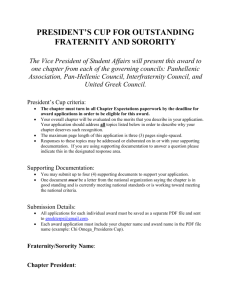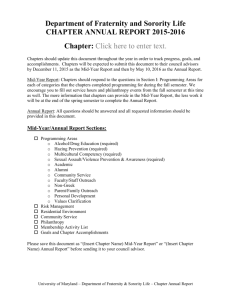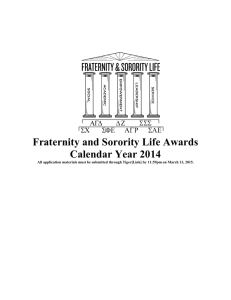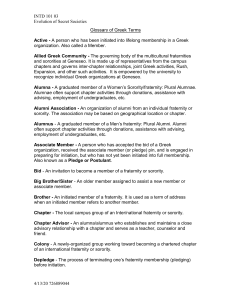Binghamton University Fraternity & Sorority Relationship Agreement
advertisement
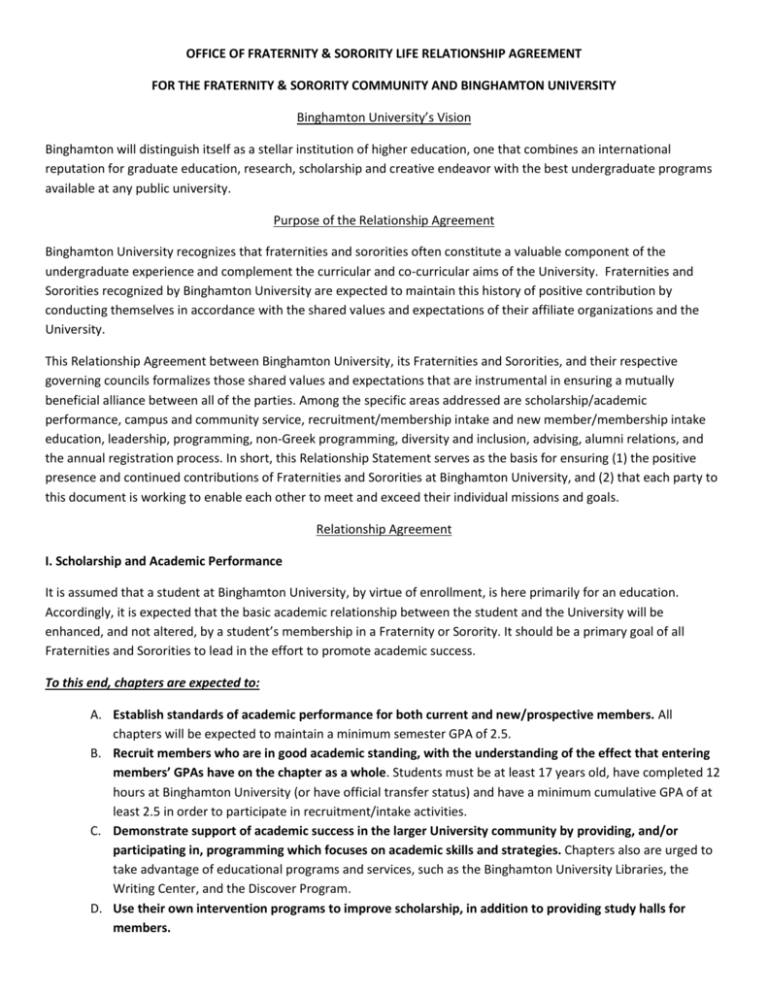
OFFICE OF FRATERNITY & SORORITY LIFE RELATIONSHIP AGREEMENT FOR THE FRATERNITY & SORORITY COMMUNITY AND BINGHAMTON UNIVERSITY Binghamton University’s Vision Binghamton will distinguish itself as a stellar institution of higher education, one that combines an international reputation for graduate education, research, scholarship and creative endeavor with the best undergraduate programs available at any public university. Purpose of the Relationship Agreement Binghamton University recognizes that fraternities and sororities often constitute a valuable component of the undergraduate experience and complement the curricular and co-curricular aims of the University. Fraternities and Sororities recognized by Binghamton University are expected to maintain this history of positive contribution by conducting themselves in accordance with the shared values and expectations of their affiliate organizations and the University. This Relationship Agreement between Binghamton University, its Fraternities and Sororities, and their respective governing councils formalizes those shared values and expectations that are instrumental in ensuring a mutually beneficial alliance between all of the parties. Among the specific areas addressed are scholarship/academic performance, campus and community service, recruitment/membership intake and new member/membership intake education, leadership, programming, non-Greek programming, diversity and inclusion, advising, alumni relations, and the annual registration process. In short, this Relationship Statement serves as the basis for ensuring (1) the positive presence and continued contributions of Fraternities and Sororities at Binghamton University, and (2) that each party to this document is working to enable each other to meet and exceed their individual missions and goals. Relationship Agreement I. Scholarship and Academic Performance It is assumed that a student at Binghamton University, by virtue of enrollment, is here primarily for an education. Accordingly, it is expected that the basic academic relationship between the student and the University will be enhanced, and not altered, by a student’s membership in a Fraternity or Sorority. It should be a primary goal of all Fraternities and Sororities to lead in the effort to promote academic success. To this end, chapters are expected to: A. Establish standards of academic performance for both current and new/prospective members. All chapters will be expected to maintain a minimum semester GPA of 2.5. B. Recruit members who are in good academic standing, with the understanding of the effect that entering members’ GPAs have on the chapter as a whole. Students must be at least 17 years old, have completed 12 hours at Binghamton University (or have official transfer status) and have a minimum cumulative GPA of at least 2.5 in order to participate in recruitment/intake activities. C. Demonstrate support of academic success in the larger University community by providing, and/or participating in, programming which focuses on academic skills and strategies. Chapters also are urged to take advantage of educational programs and services, such as the Binghamton University Libraries, the Writing Center, and the Discover Program. D. Use their own intervention programs to improve scholarship, in addition to providing study halls for members. Binghamton University will provide the following support to chapters: E. The Office of Fraternity & Sorority Life will sponsor one academic support program each semester (summer and winter sessions excluded). F. The Office of Fraternity & Sorority Life will annually recognize the chapters that meet or exceed academic standards set for Fraternities and Sororities through the “Standards of Excellence Program”. G. In order to help chapters fulfill academic expectations, the Office of Fraternity & Sorority Life will keep chapters informed of study skills training and other services available as well as schedule an orientation for new members through the Binghamton University Libraries. H. The University will assist chapters in developing and implementing academic improvement plans when necessary. I. The Office of Fraternity and Sorority Life will provide academic reports to chapter leadership in a timely manner at the conclusion of each semester to assist chapters in evaluating chapter performance and maintaining minimum standards. A chapter that fails to meet the minimum standard for Fraternity and Sorority organizations (2.5 semester GPA) will face the following sanctions: Semester 1: Chapter will be placed on academic probation and required to submit academic improvement plan. Semester 2: Social privileges will be withheld, continued academic probation, and required to submit enhanced academic improvement plan. Semester 3: Chapter recognition suspended at the discretion of the Office of Fraternity & Sorority Life and the Fraternity & Sorority Leadership Board. II. Diversity and Inclusion As is reflective of the University population, the Fraternity & Sorority Life community is comprised of individuals representing a variety of heritages, backgrounds, experiences, and perspectives as well as of individual organizations with unique histories and missions. As our campus becomes more diverse, it is essential that the Fraternity & Sorority community honors and maintains an inclusive atmosphere. To promote this effort, chapters are expected to: A. Honor the antidiscrimination policies put forth by their national affiliate organizations and the University. B. Develop an understanding of the uniqueness of each Fraternity and Sorority council and its constituent organizations while actively seeking opportunities for collaboration. C. Annually hold, or participate in, a program which focuses on diversity for either your chapter or community. Binghamton University will provide the following support to chapters: D. Ongoing diversity education and programming through the efforts of the Multicultural Resource Center, Campus Ministries, and other service areas. E. Assistance with the development of multicultural programming through the Multicultural Resource Center. F. The Office of Fraternity & Sorority Life will provide and seek out sources of funding and support to help pay for these initiative for students III. Campus and Community Service Fraternities and Sororities are key participants in the University’s ongoing efforts to serve the greater Binghamton community. The Fraternity and Sorority tradition of service includes donating thousands of volunteer hours and dollars. The continued leadership of the Fraternity and Sorority community in this area is essential to the success of Binghamton University. To this end, chapters are expected to: A. Conduct at least one chapter-sponsored service project and/or philanthropic fundraiser each semester. B. Participate in at least one University-wide/All Fraternity-Sorority community service/philanthropy per year. Examples of events are as follows but are not limited to: Relay for Life, Purim Carnival, and Dance Marathon. Determination of approved events will be set by the Office of Fraternity & Sorority Life. The focus of these efforts should be directed towards projects that assist the Binghamton region, campus community, or the national philanthropies of the chapters. In order to ensure proper tracking and recognition for excellence in service, chapters are encouraged to submit volunteer hour summary reports in B ENGAGED each month and an annual summary must be included as part of the “Standards of Excellence Program”. Additionally, pictures and detailed event descriptions should be submitted to assist with marketing and other public relations functions. Required percentages of chapter and/or chapter member participation will be determined by the Office of Fraternity & Sorority Life and/or one of the Governing Councils each year. This information will be given in a timely manner in order for appropriate preparation by chapters. Contact with the media should be coordinated through the Office of Fraternity & Sorority Life and the Office of Media and Public Relations. Chapters are encouraged to submit ideas for press releases to these offices. Binghamton University will provide the following support to chapters: C. Various offices will provide opportunities for chapters to participate in University-wide service projects and/or philanthropic fundraisers. D. University departments will provide leadership training that will assist chapters in their coordination of service projects and/or philanthropic fundraisers. E. The Office of Fraternity & Sorority Life will help provide community service/philanthropic events to fulfill service/philanthropic requirements. F. The Office of Fraternity & Sorority Life and the Office of Media and Public Relations will provide assistance with media relations and marketing. G. The Office of Fraternity & Sorority Life will track Fraternity and Sorority service hours and appropriately recognize and celebrate service initiatives through the “Standards of Excellence Program”. IV. Recruitment/Membership Intake and New Member/Membership Intake Education Membership development is the lifeblood of Fraternities and Sororities. For chapters to survive, they must continually recruit new members. It is the charge of Fraternity and Sorority organizations to enhance the experience of new/prospective members by providing membership education and utilizing ritual. To this end, chapters are expected to: A. Ensure that all new and active members are currently enrolled Binghamton University students and have been deemed eligible for membership in a Binghamton University Fraternity or Sorority. B. Maintain a chapter membership of at least 3 members. A chapter whose membership is below 3 after the membership initiation date in a semester will be given the next semester as a probationary period to recruit additional members. Membership of below 3 members after a second consecutive initiation date will result in loss of Binghamton University recognition. An organization that loses recognition for lack of members will have one semester after loss of recognition to collaborate with the (inter)national fraternity or sorority and the Office of Fraternity & Sorority Life to regain recognition. After one semester has passed, the organization will need to go through the expansion process to once again be recognized. C. Recruit members who are in good academic standing, with the understanding of the effect that entering members’ GPAs have on the chapter as a whole. Students must have completed 12 hours at Binghamton University or have official transfer status and have a minimum cumulative GPA of at least 2.5 in order to participate in recruitment/intake activities. D. Ensure that new member/membership intake activities (including campus introductions/new member reveal) last no longer than 8 academic weeks after the Formal/Informal Recruitment/Interest Meeting, and end no later than the initiation date set by the Office of Fraternity & Sorority Life. E. Submit a complete and accurate New Member Education Program and Calendar to the Office of Fraternity & Sorority Life at the beginning of each semester in which recruitment/membership intake is being conducted. The deadline date for this submission will be set by the Office of Fraternity & Sorority Life. Contents of the new member education program must be approved by the Chapter Advisor, New Member Educator/Membership Intake Coordinator, and the Office of Fraternity & Sorority Life. Once approved, it may not be altered without approval by the aforementioned entities. The New Member Education Program Should Include: a. Expectations of a New/Prospective Member. New/prospective members should be fully informed of their obligations as a new/prospective member. Examples include GPA requirement, community service hours, study hours, and chapter activities. b. Expectations of an Active Member. New/prospective members should be fully informed of their obligations as an active member. c. Scholarship Program. Academic performance should be the new/prospective member’s number one priority while going through the new member education period. Programs should be set up and enforced that emphasize the importance of academics, and new/prospective member activities should never interfere with studying for serious projects or exams. d. Community Service Opportunities. Service is an important aspect of all Fraternity and Sorority organizations. It is important that new/prospective members understand that membership in a Fraternity and Sorority organization will entail community service. e. Leadership Development. Leadership is an important aspect of Fraternity and Sorority life. Leadership should be nurtured in the new/prospective members from the beginning of the education period. New/prospective members can learn leadership skills by in a variety of ways, including holding responsibilities (such as planning an event or community service day) or by assuming elected positions in the new member/membership intake class and pairing with their chapter counterparts. f. Campus Involvement. It is important that new/prospective members are involved in organizations outside of the Fraternity & Sorority community. Chapters will encourage their new/prospective members to join at least one campus organization outside of the chapter. g. Financial Obligation/Education. Many new/prospective members are unaware of the financial commitment that is required to remain active. It is important that they understand that membership in a Fraternity or Sorority organization is a lifetime commitment, and part of that commitment is financial. h. Organization History. Education regarding the history of the individual chapters is very important. Chapters must include the basic information that is to be taught to the new/prospective members, including the methods by which they will be tested on such information. i. Binghamton Fraternity & Sorority Community Information. New members should know the following about the Binghamton University Fraternity & Sorority Life Community; the functions and F. G. H. I. J. K. L. responsibilities of each of the 7 governing councils and the Office of Fraternity & Sorority Life staff and location. j. Explanation of confidential reporting system for hazing violations within chapter. New/prospective members should have the ability to talk with the active members regarding any hazing activities. Each chapter is required to have a system in place that encourages new members to come forward to report to the chapter hazing incidents that may have occurred. k. Internal judicial procedures to ensure all members are following the program. Each chapter should have an internal judicial procedure to deal with violations of the new member/membership intake education program. Members should be held accountable for going against the ideals of the program and engaging in any hazing activities. l. Calendar of all new member/membership intake and chapter events, including dates and locations. All new member/membership intake activities (including dates and times) should be listed on a calendar of events for the entire duration of new member/membership intake education. m. Detailed description of all new member/membership intake activities. The program should include a detailed description of all new member/membership intake activities. As some activities are private, and ritualistic in nature, chapters should indicate those on their calendars. Ensure the chapter new member educator holds a meeting with a member of the Fraternity & Sorority Life staff to discuss the submitted plan/calendar. **Plan/calendar will not be approved until this meeting is held. Ensure new members visit the Office of Fraternity & Sorority Life to verify their membership. Ensure all new members attend the “New Member Meeting” held each semester. Exceptions may be granted only by the Director of Fraternity & Sorority Life and a makeup meeting must be scheduled within 1 week of the originally scheduled New Member Meeting. No new member/membership intake activities may occur from 12:00 a.m. to 7:00a.m. Monday through Friday. Any exceptions to this must be approved by the Chapter Advisor and Office of Fraternity & Sorority Life. All activities should be included on the submitted calendar and approved by the Chapter Advisor, New Member Educator/Membership Intake Coordinator, and the Office of Fraternity and Sorority Life. Academic performance by a new member/membership intake class must take priority over new member/membership intake activities. No required new activities may be scheduled which conflict with academic commitments. Chapters should develop and encourage study halls and study programs that are unique for each chapter that encourages academic success. No alcohol shall be present at any new member/pledge/associate member/neophyte program, activity, or ritual of the chapter, nor should alcohol ever be given as a gift from a Big Brother/Sister to a Little Brother/Sister or vice versa. All forms of hazing are prohibited. The Binghamton University Student Code of Conduct states the following about hazing: The term “hazing” is defined as any action taken or situation created involving prospective or new members of a group, or as a condition of continued membership in a group (fraternity, sorority, team, club, or other association or organization), which would be perceived by a reasonable person as likely to produce mental or physical discomfort, harm, stress, embarrassment, harassment or ridicule. This definition of hazing applies whether or not the participants consent to such activity or perceive the behavior as voluntary. The determination of whether a particular activity constitutes hazing will depend upon the circumstances and context in which the activity is occurring. Some examples of conduct that may constitute hazing when used to mistreat or humiliate the participant include the following: • Consumption of alcohol • Paddling in any form, or any other physical brutality • Creating excessive fatigue • • • • • • • Degrading or humiliating games or activities Forced or excessive participation in physical activities Psychological shock or abuse Engaging in public stunts or buffoonery Inappropriate scavenger hunts or road trips Wearing of apparel or items likely to subject the wearer to embarrassment or ridicule Activities that would unreasonably interfere with a student’s other activities or obligations (academic, extracurricular, religious, family, etc.) • Activities that violate University policy, federal, state or local law • Any other activity devoid of legitimate educational value that subjects participants to humiliation No policy can be so precisely written as to address all possible situations. When this policy does not address a specific behavior, students, organizations, teams and groups are expected to conduct themselves and their activities in the spirit of this policy and with respect for the dignity and well-being of others. As a guiding principle, any activity required of new members that is not required of more senior members is likely to constitute hazing under this policy. Binghamton University will provide the following support to chapters: M. The Office of Fraternity & Sorority Life will work with chapters to create and ensure that their New Member/Membership Intake Program is in compliance with the expectations of the University. N. Confidential Hazing reporting mechanisms will be offered. O. The Office of Fraternity & Sorority Life will conduct a new member orientation for the new members of each chapter to promote Fraternity and Sorority ideals create positive relationships between members and the Office of Fraternity & Sorority Life. P. Binghamton University and The Office of Fraternity & Sorority Life will provide opportunities for chapters to showcase and debut their new members, providing such activity has written support from the (inter)national fraternity or sorority. Q. Binghamton University will hold organizations accountable to these standards through either the Office of Fraternity & Sorority Life or the Office of Student Conduct. R. The Office of Fraternity & Sorority Life will recognize excellence in recruitment and new member education through awards based on the “Standards of Excellence Program”. V. Leadership Development of strong leadership among members of fraternities and sororities is vital to the success of these organizations and the community at large. To this end, chapters are expected to: A. Ensure that their officers attend the annual Greek Leadership Programming (Summit, Conference, etc) sponsored by the Office of Fraternity & Sorority Life. B. Encourage their members to take part in leadership education opportunities such as Emerging Leaders Program Mentors, the Center Leadership Studies, Dickinson Leadership Certificates, Hinman ALIVE program, and the Public Speaking Skills Lab. C. Ensure that their presidents attend the annual Presidents’ Retreat. Binghamton University will provide the following support to chapters: D. The Office of Fraternity & Sorority Life will provide officer transition support and resources to assist in the successful transition from old to new leadership. E. The Office of Fraternity & Sorority Life will sponsor an annual Presidents’ Retreat. F. The Office of Fraternity & Sorority Life will offer additional leadership programs (conferences, summits, etc) G. The Office of Fraternity & Sorority Life will sponsor scholarships for Fraternity and Sorority leaders to attend the Association of Leadership and Values annual conference, the Northeast Greek Leadership Association Annual Conference, the Undergraduate Interfraternity Institute, and other Fraternity & Sorority leadership development opportunities hosted by regional or national entities . VI. Programming Fraternity and Sorority chapters have the responsibility to provide individual members and the entire campus with quality programs that encourage critical thinking about important social and cultural issues. It is also the charge of Fraternity and Sorority organizations to nurture current members and to enhance the experience of members by providing ongoing membership education. To this end, chapters are expected to: A. All fraternities and sororities are expected to elect/appoint a Chapter Educational Programming Chair who shall coordinate all educational programming. If there is an officer currently charged with these duties, that officer can serve in this role. This officer may work with the Office of Fraternity and Sorority Life to develop educational programs for the chapter. B. All chapters will be required to conduct Sexual Assault Prevention Programming that meets SUNY requirements. C. All chapters will be expected to provide educational programming to their members. Topic ideas for educational programs include, but are not limited to: a. Values and Ethics b. Academic Support c. Alcohol and Drug Education d. University/Community Outreach e. Diversity f. Hazing g. Personal Enrichment Binghamton University will provide the following support to chapters: D. The Office of Fraternity & Sorority Life will be available to assist chapters in creating program plans and to present educational sessions. E. A variety of campus offices/programs are available to assist chapters with educational programming. Examples include, but are not limited to: a. 20 to 1 b. Multicultural Resource Center c. Career Development Center d. Center for Civic Engagement e. University Police f. Dean of Students Office g. Off Campus College h. Inter-Violence Prevention i. Alcohol and Other Drug (AOD) Resource Center VII. Advising Binghamton University strongly supports the contributions that advisors can make to the Fraternity and Sorority community and the University. We feel that it is essential for each chapter to work closely with their advisors to exemplify the ideals and values of those organizations within the Fraternity and Sorority and campus communities. To this end, it is expected that: A. B. C. D. E. Each chapter must have an advisor and/or team in accordance with the structure prescribed by the national organization or alumni board. This advisor and/or advisor team will attend chapter meetings, advise the chapter standards council, advise the chapter executive board and be represented at all initiations/rituals. The advisor and/or advisor team will maintain communication with the inter/national organizations, and their advisory model should reflect best practices established by the inter/national organizations. At minimum, the advisor team will oversee the following areas: recruitment, standards, finances, scholarship, and chapter operations. For those organizations with facilities, the alumni advisor team shall include a liaison with the House Corporation or an individual otherwise responsible for advising issues relating to chapter facilities. Advisors and members of advisor teams are expected to meet regularly with the Office of Fraternity and Sorority Life staff and participate in programs sponsored by the University specifically for Fraternity and Sorority chapter advisors. In situations where the advisor is not a faculty or staff member at Binghamton University, it is highly recommended that the chapter have a designated faculty/staff advisor to serve as a campus resource and assist with events and chapter operations. Binghamton University will provide the following support to chapters: F. G. H. I. The Office of Fraternity & Sorority Life will assist chapters in identifying potential advisors by working with the Alumni Association and other campus entities to identify local alumni, faculty, and staff who may be interested in serving as advisors. The University will provide advisors with timely communication regarding issues and concerns relating to campus Fraternity and Sorority Life and their respective chapters. The Office of Fraternity and Sorority Life will facilitate regular meetings for advisors to discuss common issues and facilitate communication. The University will provide educational opportunities and training in which advisors may participate to assist them in carrying out their responsibilities. Advisors will be made aware of and invited to, as appropriate, campus programming and events available to Fraternity and Sorority students. VIII. Alumni Relations Active members of Fraternities and Sororities are expected to foster positive relationships with alumni in order to increase the visibility and continued connection to Binghamton University. To this end, chapters are expected to: A. B. C. Provide opportunities for alumni to be involved in chapter activities, and keep them informed about events. Work with their inter/national organizations to foster relationships and locate local alumni. Foster working relationships between organizations and the Alumni Association on campus. Fraternity and Sorority organizations can be helpful in providing lists of Fraternity and Sorority alumni to university administration. Binghamton University will provide the following support to chapters: D. E. F. The Alumni Association will assist chapters with access to their alumni through their database when possible. The University will maintain a database of Binghamton University Alumni and provide chapters with data to help foster communication between current students and alumni. The Office of Fraternity & Sorority Life will work to create a Fraternity & Sorority Life Alumni Board that will work to establish a common ground for the open discussion and coordinated action on subjects that are of vital importance to the University and the Fraternity and Sorority Life community. IX. Fraternity & Sorority Fee In order to provide the highest level of support and service to the members and chapters of the Binghamton University Fraternity and Sorority Community, each initiated undergraduate member is assessed a $25/semester fee to his or her student account for the duration of their undergraduate membership. The fee is allocated as follows: A. 30% Chapter/Council Grants (Guidelines are set by the Office of Fraternity & Sorority Life and Grants are approved by the Fraternity & Sorority Leadership Board B. 20% Office of Fraternity & Sorority Life Discretionary C. 20% Retreats and Conferences D. 20% Marketing E. 5% Awards and Recognition F. 5% Emergency X. Fraternity & Sorority Leadership Board The Fraternity & Sorority Leadership Board shall meet weekly to discuss the status of the community, upcoming events, and hear proposals for funding through the Fraternity & Sorority Grant Program. In addition, the Fraternity & Sorority Leadership Board will be 1/3 of the decision making body when considering expansion proposals other than those of from organizations in the National Panhellenic Conference who must go through the official NPC Extension Procedure. The Fraternity & Sorority Leadership Board will be made up of the following individuals: A. B. C. D. E. F. G. The Director of Fraternity & Sorority Life - Chair Graduate Assistants for Fraternity & Sorority Life (non-voting) President of the Asian Greek Council or designee President of the Interfraternity Council or designee President of the Latino Greek Council or designee President of the Multicultural Greek and Fraternity Council or designee President of the National Pan-Hellenic Council or designee H. President of the Panhellenic Council or designee I. President of the Professional Fraternity Council or designee J. Two additional staff members representing Student Affairs and appointed by the Director of Fraternity & Sorority Life. Ideally one position will be a representative from the Dean of Students Office. If no one from the Dean of Students Staff is available, both appointments may be extended to other Student Affairs staff. XI. Extension/Expansion/Recognition Binghamton University recognizes that expansion/extension opportunities can enhance the quality of our community while providing new opportunities for students to affiliate. To that end, Binghamton University will accept applications for expansion from organizations who meet the following criteria: A. Have at least 20 chapters nationally or are officially recognized members of one of the Fraternity & Sorority umbrella organizations (NIC, NPC, NALFO, NPHC, NAPA, MGFC, PFA) B. Have a (inter)national constitution that includes values, standards, and mission C. Nationally as an organization support at least one specific charitable cause D. Have national contact information (phone, email, website, etc) E. Be willing to follow the Binghamton University academic criteria of a 2.5 GPA needed to become a member Starting a Fraternity or Sorority requires hard work and effort and may take several years to accomplish. Organizations begin as an interest group, move to colony status, and then finally to status as a chartered organization. The recognition process will culminate with the organization and its membership adopting pre-established standards in the areas of scholarship, philanthropy and community service, leadership, diversity, organizational management, professional development, personal development, and new/associate member and intake education program. The fraternity and sorority expansion procedure applies to: 1) Binghamton University students requesting to bring an inter/national fraternity or sorority to Binghamton University, or, 2)inter/national fraternity or sorority headquarters who seek recognition at Binghamton University. Students and/or inter/national organizations must contact the Office of Fraternity & Sorority Life to determine the institution’s current status regarding expansion timelines. Binghamton University is unlikely to approve more than one colony at a time in any single governing council. In order to receive colony status from Binghamton University, the following steps must be carried out: A. Students interested in starting a fraternity or sorority at Binghamton University may pick up an Expansion Application from the Office of Fraternity & Sorority Life. Inter/national organizations looking to expand at Binghamton University may request to have an Expansion Application to be mailed/emailed to their headquarters for review. The Expansion Application includes the following information: • Expansion/Recognition Procedures for Binghamton University Fraternities & Sororities • Demographic information on the Binghamton Fraternity & Sorority Community • Required application materials to be completed by prospective organization B. Students and the Inter/national organization will review the Expansion Application and determine if they would like to proceed in the process. If yes, the interested parties will submit all application C. D. E. F. materials to the Director of Fraternity & Sorority Life. Interested students and/or inter/national organization representatives may request a meeting to discuss the expansion process. The Director of Fraternity & Sorority Life will present all information to the Fraternity and Sorority Leadership Board for consideration and/or continuation in their expansion and recognition procedures. Once expansion consideration has been granted by the Fraternity and Sorority Leadership Board, the board will extend an invitation for a campus presentation. Inter/national organization will come to Binghamton University to present to the Fraternity and Sorority Leadership Board and the appropriate governing council (Please note that each governing council also has council-specific policies related to extension/expansion that must be met in order to receive approval). A vote will be taken by: a. Fraternity and Sorority Leadership Board b. Governing Council the organization wishes to join In the event of a split vote, the Vice-President for Student Affairs or his/her designee will hear arguments from both sides and make a final decision. G. Invitations to colonize or official recognition at Binghamton University will be extended by the Vice President for Student Affairs. XII. Fraternity and Sorority Conduct Review Process A. Organizations in violation of this Relationship Agreement or the Student Code of Conduct will be investigated and sanctioned as appropriate through the Office of Student Conduct. B. Examples of sanctions include, but are not limited to: a. Educational activities b. Probation c. Loss of social privileges d. Suspension of Recognition e. Separation (Inter/National organizations with separated chapters may apply for re-colonization after 3 years or when 80% of members known at the time of separation have left Binghamton University, whichever comes first.) XIII. “Standards of Excellence” Accreditation Program Binghamton University believes that the fraternity and sorority experience can and should be an educationally enriching and socially meaningful one that contributes to the overall sense of community on campus. While many Binghamton University’s fraternities and sororities provide this experience to their members, it is essential to have benchmarks and expectations to ensure that all members have the opportunity to enhance their collegiate experience through fraternal membership. This will help us achieve our mission to “make men better men and women better women through fostering the ideals of unity, respect, scholarship, service, and leadership.” To this end, chapters are expected to: A. Complete and submit the annual “Standards of Excellence” application to the Office of Fraternity & Sorority Life by the required deadline B. Upon receiving a score, schedule an assessment meeting with a staff member from the Office of Fraternity & Sorority Life to discuss strengths and areas for improvement Binghamton University will provide the following support to chapters: C. Annual scoring of the “Standards of Excellence” application D. Awards and recognition for outstanding performance E. Face to face chapter performance assessment based on the application submitted Annual Review Process To ensure all parties to this Relationship Statement are in compliance with all standards and shared expectations as outlined herein, the Office of Fraternity and Sorority Life will initiate an annual review process every spring semester. Additional reviews may be conducted on an as-needed basis at the request of a Fraternity or Sorority chapter, their inter/national organization, the Office of Fraternity and Sorority Life, or the Office of the Vice Chancellor for Student Affairs. Fraternity and Sorority chapters, alumni advisor teams, or inter/national organizations that violate these standards and shared expectations risk losing their status as recognized organizations at Binghamton University. All chapters will be offered due process throughout the annual review and based on the Student Code of Conduct throughout the adjudication process. Standards and shared expectations not met by the University will be listed in detail by the Fraternity and Sorority Life chapter leadership and forwarded to the Dean of Students for correction and discussion with the Vice President for Student Affairs. Review and Revision This Relationship Statement between the Fraternity & Sorority Community and Binghamton University is expected to evolve. Chapters in conjunction with the Dean of Students and Director of Fraternity & Sorority Life will review this Relationship Statement two (2) years after its adoption to determine if amendment and revision are required. Thereafter, this document will be reviewed every three (3) years. Suggestions or proposed revisions to this document will be forwarded to the Dean of Students for review and implementation.
